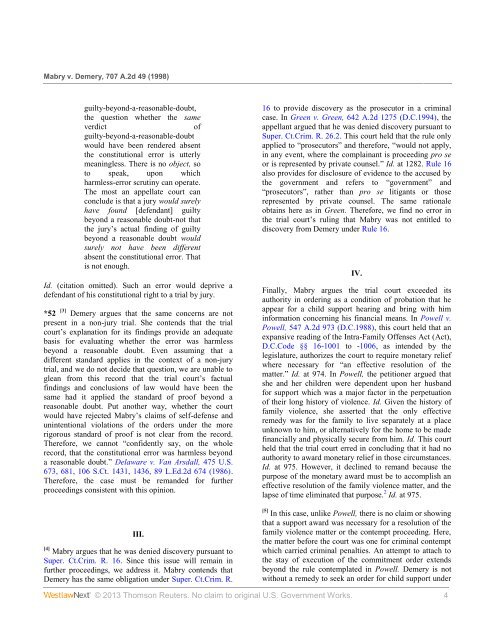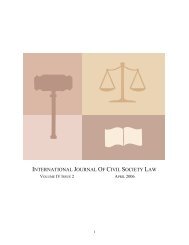Mabry v. Demery - Law Clinics
Mabry v. Demery - Law Clinics
Mabry v. Demery - Law Clinics
Create successful ePaper yourself
Turn your PDF publications into a flip-book with our unique Google optimized e-Paper software.
<strong>Mabry</strong> v. <strong>Demery</strong>, 707 A.2d 49 (1998)guilty-beyond-a-reasonable-doubt,the question whether the sameverdictofguilty-beyond-a-reasonable-doubtwould have been rendered absentthe constitutional error is utterlymeaningless. There is no object, soto speak, upon whichharmless-error scrutiny can operate.The most an appellate court canconclude is that a jury would surelyhave found [defendant] guiltybeyond a reasonable doubt-not thatthe jury’s actual finding of guiltybeyond a reasonable doubt wouldsurely not have been differentabsent the constitutional error. Thatis not enough.Id. (citation omitted). Such an error would deprive adefendant of his constitutional right to a trial by jury.*52 [3] <strong>Demery</strong> argues that the same concerns are notpresent in a non-jury trial. She contends that the trialcourt’s explanation for its findings provide an adequatebasis for evaluating whether the error was harmlessbeyond a reasonable doubt. Even assuming that adifferent standard applies in the context of a non-jurytrial, and we do not decide that question, we are unable toglean from this record that the trial court’s factualfindings and conclusions of law would have been thesame had it applied the standard of proof beyond areasonable doubt. Put another way, whether the courtwould have rejected <strong>Mabry</strong>’s claims of self-defense andunintentional violations of the orders under the morerigorous standard of proof is not clear from the record.Therefore, we cannot “confidently say, on the wholerecord, that the constitutional error was harmless beyonda reasonable doubt.” Delaware v. Van Arsdall, 475 U.S.673, 681, 106 S.Ct. 1431, 1436, 89 L.Ed.2d 674 (1986).Therefore, the case must be remanded for furtherproceedings consistent with this opinion.III.[4] <strong>Mabry</strong> argues that he was denied discovery pursuant toSuper. Ct.Crim. R. 16. Since this issue will remain infurther proceedings, we address it. <strong>Mabry</strong> contends that<strong>Demery</strong> has the same obligation under Super. Ct.Crim. R.16 to provide discovery as the prosecutor in a criminalcase. In Green v. Green, 642 A.2d 1275 (D.C.1994), theappellant argued that he was denied discovery pursuant toSuper. Ct.Crim. R. 26.2. This court held that the rule onlyapplied to “prosecutors” and therefore, “would not apply,in any event, where the complainant is proceeding pro seor is represented by private counsel.” Id. at 1282. Rule 16also provides for disclosure of evidence to the accused bythe government and refers to “government” and“prosecutors”, rather than pro se litigants or thoserepresented by private counsel. The same rationaleobtains here as in Green. Therefore, we find no error inthe trial court’s ruling that <strong>Mabry</strong> was not entitled todiscovery from <strong>Demery</strong> under Rule 16.IV.Finally, <strong>Mabry</strong> argues the trial court exceeded itsauthority in ordering as a condition of probation that heappear for a child support hearing and bring with himinformation concerning his financial means. In Powell v.Powell, 547 A.2d 973 (D.C.1988), this court held that anexpansive reading of the Intra-Family Offenses Act (Act),D.C.Code §§ 16-1001 to -1006, as intended by thelegislature, authorizes the court to require monetary reliefwhere necessary for “an effective resolution of thematter.” Id. at 974. In Powell, the petitioner argued thatshe and her children were dependent upon her husbandfor support which was a major factor in the perpetuationof their long history of violence. Id. Given the history offamily violence, she asserted that the only effectiveremedy was for the family to live separately at a placeunknown to him, or alternatively for the home to be madefinancially and physically secure from him. Id. This courtheld that the trial court erred in concluding that it had noauthority to award monetary relief in those circumstances.Id. at 975. However, it declined to remand because thepurpose of the monetary award must be to accomplish aneffective resolution of the family violence matter, and thelapse of time eliminated that purpose. 2 Id. at 975.[5] In this case, unlike Powell, there is no claim or showingthat a support award was necessary for a resolution of thefamily violence matter or the contempt proceeding. Here,the matter before the court was one for criminal contemptwhich carried criminal penalties. An attempt to attach tothe stay of execution of the commitment order extendsbeyond the rule contemplated in Powell. <strong>Demery</strong> is notwithout a remedy to seek an order for child support under© 2013 Thomson Reuters. No claim to original U.S. Government Works. 4
















